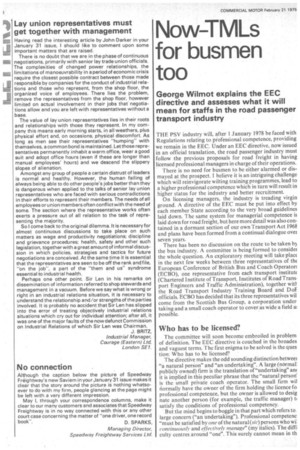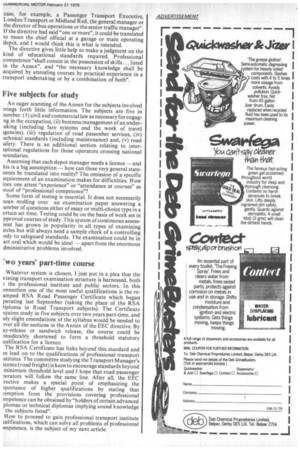Now-TMLs for busmen too
Page 48

Page 49

If you've noticed an error in this article please click here to report it so we can fix it.
George Wilmot explains the EEC directive and assesses what it will mean for staffs in the road passenger transport industry
THE PSV industry will, after 1 January 1978 be faced with Regulations relating to professional competence, providing we remain in the EEC. Under an EEC directive, now issued in an official translation, the road passenger industry must follow the previous proposals for road freight in having licensed professional managers in charge of their operations.
There is no need for busmen to be either alarmed or dismayed at the prospect. I believe it is an intriguing challenge which will reinvigorate wilting training programmes, lead to a higher professional competence which in turn will result in higher status for the industry and better recruitment. On licensing managers, the industry is treading virgin ground. A directive of the EEC must be put into effect by each member State according to the very broad guidelines laid down. The same system for managerial competence is laid down for road freight, but here more detail was also contained in a dormant section of our own Transport Act 1968 and plans have been formed from a continual dialogue (wet seven years.
There has been no discussion on the route to be taken b} the bus industry. A committee is being formed to considei the whole question. An exploratory meeting will take place in the next few weeks between three representatives of the European Conference of British Bus and Coach Operatori (ECBO), one representative from each transport institut( (Chartered Institute of Transport, Institutes of Road Trans. port Engineers and Traffic Administration), together witl. the Road Transport Industry Training Board and DoE officials. ECBO has decided that its three representatives wil come from the Scottish Bus Group, a corporation under taking and a small coach operator to cover as wide a field a! possible.
Who has to be licensed?
The committee will soon become embroiled in problem of definition. The EEC directive is couched in the broades and vaguest terms. The first enigma to be solved is the ques lion: Who has to be licensed?
The directive makes the odd sounding distinction betweei "a natural person" and "an undertaking". A large (normafl publicly owned) firm is the translation of "undertaking" an( it is implied in this peculiar phrase that the "natural person' is the small private coach operator. The small firm wil normally have the owner of the firm holding the licence fo professional competence, but the owner is allowed to desig nate another person (for example, the traffic manager) t( satisfy the conditions of professional competency.
But the mind begins to boggle in that part which refers to large concern ("an undertaking"). Professional competenc "must be satisfied by one of the natural (sic) persons who wil continuously and effectively manage" (my italics). The diffi culty centres around "one". This surely cannot mean in th case, for example, a Passenger Transport Executive, London Transport or Midland Red, the general manager or the director of bus operations or the senior traffic manager". If the directive had said "one or more", it could be translated to mean the chief official at a garage or main operating depot, and I would think this is what is intended.
The directive gives little help to make a judgment on the kind of educational standards required. Professional competence "shall consist in the possession of skills ... listed in the Annex", and "the necessary knowledge shall be acquired by attending courses by practical experience in a transport undertaking or by a combination of both".
Five subjects for study
An eager scanning of the Annex for the subjects involved 'rings forth little information. The subjects are five in lumber: (I) civil and commercial law as necessary for engagng in the occupation, (ii) business management of an underaking (including fare systems and the work of travel tgencies), (iii) regulation of road passenber services, (iv) echnical standards (including maintenance) and, (v) road Lafety. There is an additional section relating to interiational regulations for those operators crossing national ioundaries.
Assuming that each depot manager needs a licence — and his is a big assumption — how can these very general statenents be translated into reality? The omission of a specific equirement of an examination makes for difficulties. How loes one attest "experience" or "attendance at courses" as 'roof of "professional competence"?
Some form of testing is essential. It does not necessarily aean mulling over an examination paper answering a Lumber of questions either of essay or multi-choice type in a ertain set time. Testing could be on the basis of work set in pproved courses of study. This system of continuous assesslent has grown in popularity in all types of examining ircles but will always need a sample check of a controlling ody to safeguard standards. The examination could be in art oral which would be ideal — apart from the enormous dministrative problems involved.
7wo years' part-time course
Whatever system is chosen, I just put in a plea that the xisting transport examination structure is harnessed, both the professional institute and public sectors. In this onnection one of the most useful qualifications is the reamped RSA Road Passenger Certificate which began perating last September (taking the place of the RSA liplotna in Road Transport subjects). The Certificate !quires study in five subjects over two years part-time, and nly slight emendations of the syllabus would be needed to aver all the sections in the Annex of the EEC directive. By ay-release or sandwich release, the course could be misiderably shortened to form a threshold statutory ualification for a licence.
The RSA Certificate has links beyond this standard and tn lead on to the qualifications of professional transport istitutes. The committee studying the Transport Manager's icence (road freight) is keen to encourage standards beyond minimum threshold level and I hope that road passenger aerators will follow the same line. After all, the EEC rective makes a special point of emphasizing the aportance of higher qualifications by stating that :emption from the provisions covering professional impetence can be obtained by "holders of certain advanced plomas or technical diplomas implying sound knowledge the subjects listed".
How to proceed to gain professional transport institute talifications, which can solve all problems of professional Impetence, is the subject of my next article.












































































































